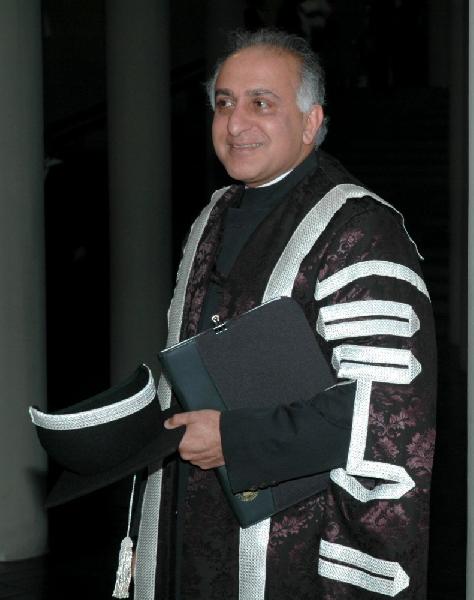
In the myriad speeches which are made over Graduation weekend, the opening of the proceedings by the Vice-Chancellor Dr Saleem Badat sets the tone and gives the newly-minted graduates something to take out with them into the world.
In his opening speech yesterday Dr Badat opened by congratulating the graduates, and reminded them that at Rhodes University, learning and education is a partnership, of which they have fulfilled their side of the bargain.
Their achievement was not made in isolation. He reminded them of the contribution of lecturers, tutors, lab and computer technicians, adminstrators, warden, cooks, cleaners and gardeners, who work to create the study environment for which Rhodes University is justly renowned. The role of families and benefactors was also acknowledged.
Dr Badat then turned his thoughts towards the idea of citizenship. In the context of the past and current fissures within South African society, he asked what progress has been made since 1994's revolutionary breakthrough towards forging an inclusive citizenship?
“Having been ‘subjects,’ millions of us made the significant transition and advance to becoming ‘citizens’. We looked forward to the promise of the progressive realisation of hard-won citizenship rights so that we could live productive, rich, rewarding and secure lives.”
Here, however, reality intrudes. While there can be no quarrel with seeking equity for poor, black and female South Africans, by doing so our society finds itself in what Dr Badat refers to as a 'profound paradox' – the use of race to promote redress and to advance social equity. Surely, says Dr Badat, our aim must be to dissolve racial categorisations, ensuring instead that we develop identities which are rich, fluid, multiple and dynamic. The goal of establishing a society where social and cultural diversity is celebrated, and in which race has no political or economic significance, must never be lost sight of.
Dr Badat encouraged all the new graduates, with the “dust of Africa” on their shoes, to loudly proclaim the words found in our Constitution, that ' South Africa belongs to all who live in it, united in our diversity.' We are all Africans. Many issues such a race, culture and identity remain to be confronted before we can truly embrace diversity. However, he affirms, we shy away from engagement with these issues at our own peril.
Himself not one to shy away from vital issues, Dr Badat then encouraged the 2011 graduates to engage with the growing incidence of critics of the government being forced into silence by the questioning of their struggle credentials. The view that citizens have no right to express their opinions unless they can be shown to have participated in the anti-apartheid struggle is, says Dr Badat not only wrong but dangerous. It turns millions of citizens, including all born after 1994, into subjects, making a mockery of the Constitution. As citizens, he reminded his audience, we have a duty to 'speak truth to power'.
The world into which our graduates are entering is not a fair one. In a damning indictment Dr Badat revealed that during the 17 years since free and fair elections, the poorest 20% of South African society has got poorer, while the richest 20% has got richer. While millions of citizens are engaged in the desperate struggle for mere survival, materialism, corruption and tenderpreneurship run rampant.
Acknowledging that South Africa's institutions of democracy, justice and the media remain robust, he warns that, in 2011, our citizenship is not yet fully developed. We are not yet living in a way which respects and enhances the freedom of all, and the notion that with freedom comes responsibility does not appear to hold sway among those in positions of power.
The graduates of 2011 come from a generation who have had the freedom to shape their identities and ideas in a manner hopefully free from the obsession with race which has marred previous generations of South Africans. South Africa, Dr Badat told them, looks to them, armed with skills and expertise, to work not only for private benefit but for the good of society. Leadership is not attained through degrees, wealth or high office, rather: “It must be earned through ethical conduct, impeccable integrity, visionary endeavour, selfless public service and commitment to people and responsibilities.”
Dr Badat finished with this tribute to the 2011 Graduates: “Today is your day, to remember, to celebrate and cherish. No doubt the parties will extend long into the night and there will be much merriment. You have earned it and I wish you a wonderful and joyful day of celebration of your achievement and your future promise.”
Vice-Chancellor’s graduation speech click here
